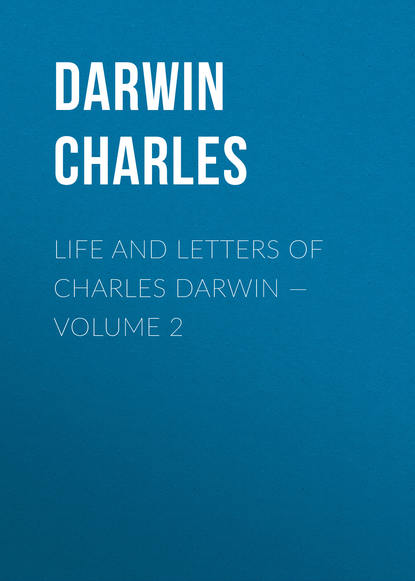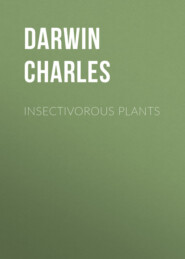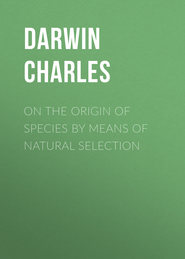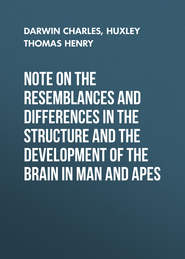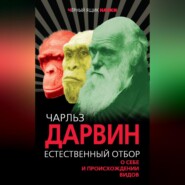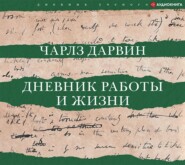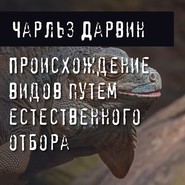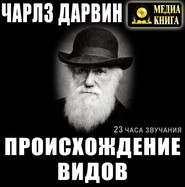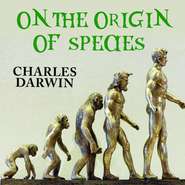По всем вопросам обращайтесь на: info@litportal.ru
(©) 2003-2024.
✖
Life and Letters of Charles Darwin — Volume 2
Настройки чтения
Размер шрифта
Высота строк
Поля
I remain, dear Sir, Yours faithfully, CH. DARWIN.
[The two following extracts show the lively interest he preserved in diverse fields of enquiry. Professor Cohn of Breslau had mentioned, in a letter, Koch's researches on Splenic Fever, my father replied, January 3: —
"I well remember saying to myself, between twenty and thirty years ago, that if ever the origin of any infectious disease could be proved, it would be the greatest triumph to science; and now I rejoice to have seen the triumph."
In the spring he received a copy of Dr. E. von Mojsisovics' 'Dolomit Riffe,' his letter to the author (June 1, 1878) is interesting as bearing on the influence of his own work on the methods of geology.
"I have at last found time to read the first chapter of your 'Dolomit Riffe,' and have been EXCEEDINGLY interested by it. What a wonderful change in the future of Geological chronology you indicate, by assuming the descent theory to be established, and then taking the graduated changes of the same group of organisms as the true standard! I never hoped to live to see such a step even proposed by any one."
Another geological research which roused my father's admiration was Mr. D. Mackintosh's work on erratic blocks. Apart from its intrinsic merit the work keenly excited his sympathy from the conditions under which it was executed, Mr. Mackintosh being compelled to give nearly his whole time to tuition. The following passage is from a letter to Mr. Mackintosh of October 9, 1879, and refers to his paper in the Journal of the Geological Society, 1878: —
"I hope that you will allow me to have the pleasure of thanking you for the very great pleasure which I have derived from just reading your paper on erratic blocks. The map is wonderful, and what labour each of those lines show! I have thought for some years that the agency of floating ice, which nearly half a century ago was overrated, has of late been underrated. You are the sole man who has ever noticed the distinction suggested by me (In his paper on the 'Ancient Glaciers of Carnarvonshire,' Phil. Mag. xxi. 1842.) between flat or planed scored rocks, and mammillated scored rocks."]
CHARLES DARWIN TO C. RIDLEY. Down, November 28, 1878.
Dear Sir,
I just skimmed through Dr. Pusey's sermon, as published in the "Guardian", but it did [not] seem to me worthy of any attention. As I have never answered criticisms excepting those made by scientific men, I am not willing that this letter should be published; but I have no objection to your saying that you sent me the three questions, and that I answered that Dr. Pusey was mistaken in imagining that I wrote the 'Origin' with any relation whatever to Theology. I should have thought that this would have been evident to any one who had taken the trouble to read the book, more especially as in the opening lines of the introduction I specify how the subject arose in my mind. This answer disposes of your two other questions; but I may add that many years ago, when I was collecting facts for the 'Origin,' my belief in what is called a personal God was as firm as that of Dr. Pusey himself, and as to the eternity of matter I have never troubled myself about such insoluble questions. Dr. Pusey's attack will be as powerless to retard by a day the belief in Evolution, as were the virulent attacks made by divines fifty years ago against Geology, and the still older ones of the Catholic Church against Galileo, for the public is wise enough always to follow Scientific men when they agree on any subject; and now there is almost complete unanimity amongst Biologists about Evolution, though there is still considerable difference as to the means, such as how far natural selection has acted, and how far external conditions, or whether there exists some mysterious innate tendency to perfectability. I remain, dear Sir,
Yours faithfully, CH. DARWIN.
[Theologians were not the only adversaries of freedom in science. On September 22, 1877, Prof. Virchow delivered an address at the Munich meeting of German Naturalists and Physicians, which had the effect of connecting Socialism with the Descent theory. This point of view was taken up by anti-evolutionists to such an extent that, according to Haeckel, the "Kreuz Zeitung" threw "all the blame of" the "treasonable attempts of the democrats Hodel and Nobiling... directly on the theory of Descent." Prof. Haeckel replied with vigour and ability in his 'Freedom in Science and Teaching' (English Translation 1879), an essay which must have the sympathy of all lovers of freedom.
The following passage from a letter (December 26, 1879) to Dr. Scherzer, the author of the 'Voyage of the "Novara",' gives a hint of my father's views on this once burning question: —
"What a foolish idea seems to prevail in Germany on the connection between Socialism and Evolution through Natural Selection."]
CHARLES DARWIN TO H.N. MOSELEY. (Professor of Zoology at Oxford. The book alluded to is Prof. Moseley's 'Notes by a Naturalist on the "Challenger".') Down, January 20, 1879.
Dear Moseley,
I have just received your book, and I declare that never in my life have I seen a dedication which I admired so much. ("To Charles Darwin, Esquire, LL.D., F.R.S., etc., from the study of whose 'Journal of Researches' I mainly derived my desire to travel round the world; to the development of whose theory I owe the principal pleasures and interests of my life, and who has personally given me much kindly encouragement in the prosecution of my studies, this book is, by permission, gratefully dedicated.") Of course I am not a fair judge, but I hope that I speak dispassionately, though you have touched me in my very tenderest point, by saying that my old Journal mainly gave you the wish to travel as a Naturalist. I shall begin to read your book this very evening, and am sure that I shall enjoy it much.
Yours very sincerely, CH. DARWIN.
CHARLES DARWIN TO H.N. MOSELEY. Down, February 4, 1879.
Dear Moseley,
I have at last read every word of your book, and it has excited in me greater interest than any other scientific book which I have read for a long time. You will perhaps be surprised how slow I have been, but my head prevents me reading except at intervals. If I were asked which parts have interested me most, I should be somewhat puzzled to answer. I fancy that the general reader would prefer your account of Japan. For myself I hesitate between your discussions and description of the Southern ice, which seems to me admirable, and the last chapter which contained many facts and views new to me, though I had read your papers on the stony Hydroid Corals, yet your resume made me realise better than I had done before, what a most curious case it is.
You have also collected a surprising number of valuable facts bearing on the dispersal of plants, far more than in any other book known to me. In fact your volume is a mass of interesting facts and discussions, with hardly a superfluous word; and I heartily congratulate you on its publication.
Your dedication makes me prouder than ever.
Believe me, yours sincerely, CH. DARWIN.
[In November, 1879, he answered for Mr. Galton a series of questions utilised in his 'Inquiries into Human Faculty,' 1883. He wrote to Mr. Galton: —
"I have answered the questions as well as I could, but they are miserably answered, for I have never tried looking into my own mind. Unless others answer very much better than I can do, you will get no good from your queries. Do you not think you ought to have the age of the answerer? I think so, because I can call up faces of many schoolboys, not seen for sixty years, with MUCH DISTINCTNESS, but nowadays I may talk with a man for an hour, and see him several times consecutively, and, after a month, I am utterly unable to recollect what he is at all like. The picture is quite washed out. The greater number of the answers are given in the annexed table."]
QUESTIONS ON THE FACULTY OF VISUALISING.
1. ILLUMINATION? Moderate, but my solitary breakfast was early, and the morning dark.
2. DEFINITION? Some objects quite defined, a slice of cold beef, some grapes and a pear, the state of my plate when I had finished, and a few other objects, are as distinct as if I had photo's before me.
3. COMPLETENESS? Very moderately so.
4. COLOURING? The objects above named perfectly coloured.
5. EXTENT OF FIELD OF VIEW? Rather small.
DIFFERENT KINDS OF IMAGERY.
6. PRINTED PAGES. I cannot remember a single sentence, but I remember the place of the sentence and the kind of type.
7. FURNITURE? I have never attended to it.
8. PERSONS? I remember the faces of persons formerly well-known vividly, and can make them do anything I like.
9. SCENERY? Remembrance vivid and distinct, and gives me pleasure.
10. GEOGRAPHY? No.
11. MILITARY MOVEMENTS? No.
12. MECHANISM? Never tried.
13. GEOMETRY? I do not think I have any power of the kind.
14. NUMERALS? When I think of any number, printed figures arise before my mind. I can't remember for an hour four consecutive figures.
15. CARD PLAYING? Have not played for many years, but I am sure should not remember.
16. CHESS? Never played.
[In 1880 he published a short paper in 'Nature' (volume xxi. page 207) on the "Fertility of Hybrids from the common and Chinese goose." He received the hybrids from the Rev. Dr. Goodacre, and was glad of the opportunity of testing the accuracy of the statement that these species are fertile inter se. This fact, which was given in the 'Origin' on the authority of Mr. Eyton, he considered the most remarkable as yet recorded with respect to the fertility of hybrids. The fact (as confirmed by himself and Dr. Goodacre) is of interest as giving another proof that sterility is no criterion of specific difference, since the two species of goose now shown to be fertile inter se are so distinct that they have been placed by some authorities in distinct genera or sub-genera.
The following letter refers to Mr. Huxley's lecture: "The Coming of Age of the Origin of Species" (This same "Coming of Age" was the subject of an address from the Council of the Otago Institute. It is given in 'Nature,' February 24, 1881.), given at the Royal Institution, April 9, 1880, published in 'Nature,' and in 'Science and Culture,' page 310:]
CHARLES DARWIN TO T.H. HUXLEY. Abinger Hall, Dorking, Sunday, April 11, 1880.
My dear Huxley,
I wished much to attend your Lecture, but I have had a bad cough, and we have come here to see whether a change would do me good, as it has done. What a magnificent success your lecture seems to have been, as I judge from the reports in the "Standard" and "Daily News", and more especially from the accounts given me by three of my children. I suppose that you have not written out your lecture, so I fear there is no chance of its being printed in extenso. You appear to have piled, as on so many other occasions, honours high and thick on my old head. But I well know how great a part you have played in establishing and spreading the belief in the descen-theory, ever since that grand review in the "Times" and the battle royal at Oxford up to the present day.
Ever my dear Huxley, Yours sincerely and gratefully, CHARLES DARWIN.





